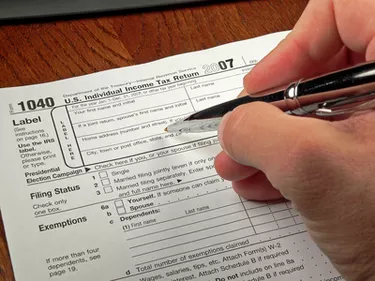
Each year, the Internal Revenue Service processes tens of millions of tax returns from individuals, married couples, businesses and organizations. Once the IRS processes a tax return, it can determine if the applicant owes the government taxes, or if the government owes him a tax refund. The step-by-step procedures by which a tax return is processed are fairly straightforward.
Completion of the Application
Video of the Day
In order for the IRS to process your tax refund, you must include a completed tax return form free of errors and completely filled out. If you must fill out any additional forms, such as the Schedule C form for home businesses, or any forms related to special taxable situations such as alimony or unearned income, you must include these completed forms with your tax return. Mail the entire return, including any additional forms, to the IRS, or file the return electronically using tax preparation software or the online programs of tax prep specialists.
Video of the Day
IRS Receives the Return
The IRS processes all tax returns on a first-come, first-served basis. Because electronically filed returns arrive faster, the IRS gets to them more quickly than if you mail them. If you file electronically or provide an email address with your tax return, the IRS will send you an email notice that it has received your return. You may also receive an estimated time for when the IRS will process your return.
IRS Reviews the Return
The IRS reviews all tax returns for errors and discrepancies. During this time, the IRS may select your tax return for examination and auditing. The IRS bases this selection process due to various criteria, including computer scoring on the potential for unreported income and other factors. If your tax return has no errors or discrepancies and the IRS does not determine it's a candidate for auditing, it will begin processing your tax return.
Determination of Taxes Owed or Refunded
Once the IRS processes your tax return, it makes a determination about your taxes for the year. If you overpaid your taxes, or if you are entitled to certain income exemptions such as the Earned Income Tax Credit, which exceed your tax liability, the IRS will determine that you are entitled to a refund. You will receive a check for the refund amount in the mail or through direct deposit, whichever you indicated on your tax return. If the IRS determines that your tax payments for the year didn't fully cover your tax liability, you will owe the IRS the amount of the difference.